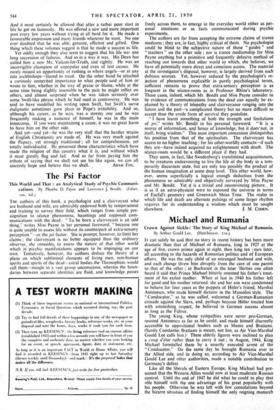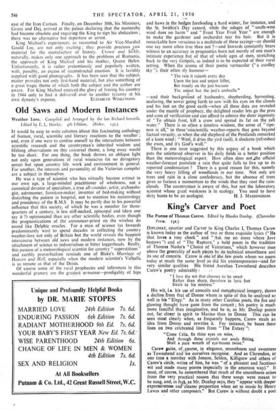Michael and Rumania
Crown Against Sickle: The Story of King Michael of Rumania.
IT can safely be said that no story in recent history has been more dramatic than that of Michael of Rumania, king in 1927 at the age of five, crown prince again at eight, then king ten 3 ears later, all according to the hazards of Rumanian politics and of European affairs. He was the only child of an estranged husband and wife, and each change threw him abruptly from the care of one parent to that of the other ; in Bucharest in the later 'thirties one often heard it said that Prince Michael' bitterly resented his father's treat- ment of his exiled mother. When at last in 1940 his father left for good and his mother returned, she and her son were condemned to behave for four years as the puppets of Hitler's friend, Marshal Anteinescu, who made himself dictator in the Mussolini style. The "Conducator," as he was called, welcomed a German-Rumanian crusade against the Slays, and, perhaps because Hitler' treated him with astonishing respect, he believed in German success almost as long as the Fiihrer.
The young King, whose sympathies were never pro-German, resisted Antonescu as far as he could, and made himself discreetly accessible to oppositional leaders such as Maniu and Bratianu. (Surely Constantin Bratianu is meant, not Ion, as Air Vice-Marshal Gould Lee calls him.) These elderly figures were inclined to plan a coup d'etat rather than to carry it out ; in August, 1944, King Michael forestalled them by a smartly executed arrest of the "Conducator." On the same day he brought Rumania over to the Allied side, and in doing so, according to Air Vice-Marshal Gould Lee and other authorities, made a notable contribution to Germany's defeat.
Like all the liberals of Eastern Europe, King Michael had pre- sumed that the Western Allies would now at least moderate Russian control. Until the end of 1947 he did what he could to play that role himself with the one advantage of his great popularity with his people. Otherwise he was left with few consolations beyond the bizarre situation of finding himself the only reigning monarch east of the Iron Curtain. Finally, on December 30th, his Ministers, Groza and Dej, arrived at the palace declaring that the monarchy had become obsolete and requiring the King to sign his abdication ; there was no alternative but departure or arrest. King Michael's experiences, as recounted to Air Vice-Marshal Gould Lee, are not only exciting ; they provide precious .raw material for the manufacture of history. Crown and Sickle, naturally, makes only one approach to the problems of Rumania, the approach of King Michael and his mother, Queen Helen. Unfortunately, it is rather pretentiously and popularly written, with, possibly, an excess of reconstructed emotion. It is lavishly supplied with good photographs. It has been seen that the subject- matter provides not only first-hand material, but also something of a great tragic theme of which both the subject and the author are aware. For King Michael enjoyed-the glory of freeing his country in 1944 only to find it delivered over to another tyranny at his







































 Previous page
Previous page